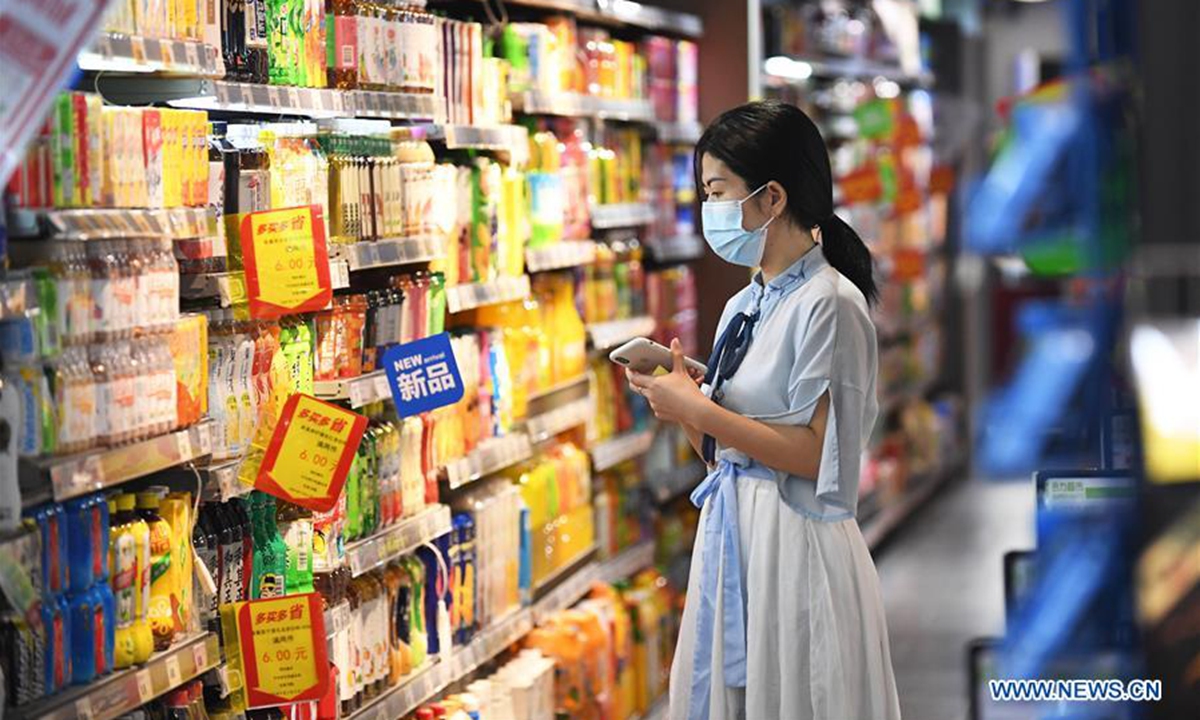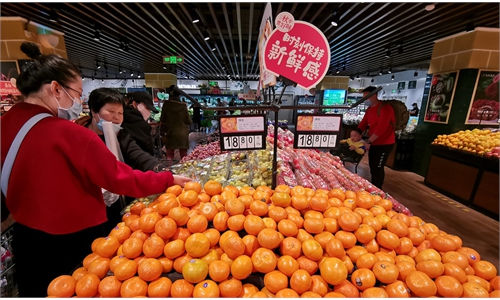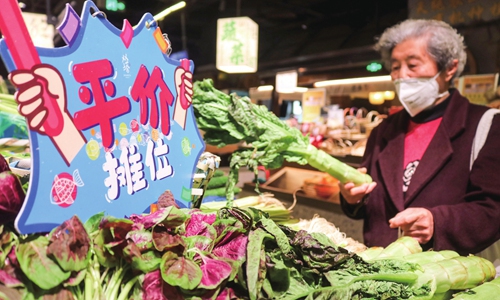China's CPI rises 2.7% in July, but remains overall stable, in stark contrast to US

A customer selects drinks at a supermarket in Guiyang, southwest China's Guizhou Province. Photo: Xinhua
China's consumer price index (CPI) quickened to a two-year high of 2.7 percent year-on-year in July amid steady food price rises and seasonal factors. But China's inflation remains overall stable, in stark contrast to sky-high inflation in major economies around the world, including the US which saw an 8.5-percent rise in CPI in July.
Experts said that China's policies to bolster the economy may lead to a moderate rise in consumer prices in the second half of the year, but the country will be able to attain its annual CPI growth target of 3 percent, given its capability in dealing with external uncertainties and ensuring the supply of important livelihood-related products and key bulk commodities.
According to data released by the National Bureau of Statistics (NBS) on Wednesday, the CPI rose 2.7 percent year-on-year in July, expanding from 2.5 percent in June. Though lower than most analysts' forecasts of 2.9 percent growth, last month's figure was the highest since July 2020.
The increase was mainly due to steep food price rises, including pork and vegetables, according to data.
Food prices rose 6.3 percent year-on-year in July, contributing 1.12 percentage points to the monthly CPI increase, noted Dong Lijuan, a statistician from the NBS.
In July, pork price rose 20.2 percent year-on-year, reversing a drop of 6 percent in June. Prices of fruits and vegetables rose by 16.9 percent and 12.9 percent year-on-year, respectively, NBS data showed.
However, the core CPI, which excludes food and energy prices, gained only 0.8 percent in July, lower than the 1 percent increase in June, reflecting overall steady prices for consumer goods and services.
Although the CPI is approaching the 3-percent annual target, the performance of the core CPI indicates that the focus of domestic policies should still be on supporting epidemic-hit enterprises and spurring domestic demand, Zhou Maohua, a macroeconomic analyst at Everbright Bank, told the Global Times.
"On the one hand, measures to ensure supply and stabilize economic growth should be earnestly implemented to release market entities' vitality. On the other hand, effective investment is needed to create more jobs and increase people's incomes to shore up demand," he said.
Looking ahead, China's CPI may moderately rise in the second half of the year, driven up by policy incentives to boost economic recovery, Zhou said. He added that the country's bumper harvests will ensure sufficient supplies of fruits and vegetables, and effective measures to stabilize domestic energy prices will ease the transmission from upstream factory prices to consumer prices.
The People's Bank of China, the central bank, said in a quarterly report on monetary policy implementation on Wednesday that China is expected to see its CPI remain in a reasonable range, and is capable of attaining its 3-percent annual target.
The central bank will cement favorable conditions for stable crop output and steady energy market operations, and closely follow and appropriately deal with domestic and overseas inflation.
In the meantime, it will continue to maintain reasonable and sufficient liquidity to ramp up support for the real economy, while providing reasonable increases in money supply and aggregate social financing to strive for the best results of full-year economic growth.
In contrast to China's prudent monetary policy, the US adopted ultra-loose monetary policies in the wake of the COVID-19 pandemic, and as a result, its domestic inflation rates have stayed above 8 percent in recent months. The US' CPI stood at 8.5 percent in July, slightly down from its 40-year peak of 9.1 percent in the previous month.
The US and other major Western economies have taken the rare move of approving unusually large interest rate hikes this year, reflecting the seriousness of overall global inflation, Cao Yuanzheng, chief economist at Bank of China International, told the Global Times on Wednesday.
He predicted that developed economies may plunge into recession by the end of this year or the beginning of 2023.
"As the world is undergoing deep adjustment, major economies need to step up coordination and cooperation to inject momentum to global economic recovery," Cao said.
China's producer price index (PPI), a main gauge of factory prices, decelerated to grow 4.2 percent year-on-year in July, down from 6.1 percent in June, according to the NBS.
Prices of industrial products are broadly dropping due to a variety of internal and external factors. For example, prices in the coal mining sector rose 20.7 percent year-on-year in July, down 10.7 percentage points from the previous month, while petroleum and natural gas exploration rose 43.9 percent year-on-year, down 10.5 percentage points from June, NBS data revealed.


